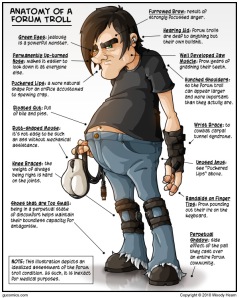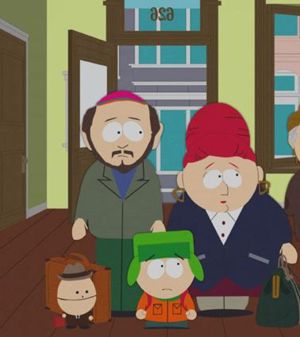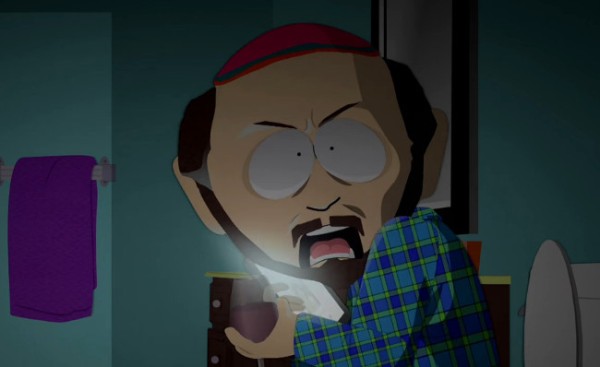Author: Jacqueline Eaton-Willard ¦ October 17, 2026
South Park is a show that succeeds on its irreverence toward all things, the idea that “nobody’s safe” from criticism. Most iconically, they have ridiculed religious institutions such as Scientology, Christianity, Mormonism, and Islam. And let’s not forget that in nearly every episode Cartman makes jibes at Kyle’s Jewish heritage. Despite its tongue-in-cheek portrayal of religion, its political criticism and social commentary is often painfully on point. This year’s 20th season is no different, and creators Trey Parker and Matt Stone have taken on the interesting social phenomena of trolling and the strangely nostalgic characteristics that are being exhibited through media, such as Netflix’s original show Stranger Things (shameless self promotion of podcast HERE).
Trolling, for those in the know, are a staple of internet culture that thrive off of negative attention through their hateful, offensive, and provocative posts. They are largely anonymous due to the ambiguity of the internet and can harass an individual or group through online message boards, direct messages, or comments on social media sites. In some cases, personal emails, home or work addresses, and phone numbers can be found and used by avid trolls to cross from the virtual world and into real life with threats of violence, rape, and murder on chosen victims or groups. South Park has taken the first episodes of this season and given us a peak behind the computer screen and into the world of such trolls.

Anatomy of a Forum Troll by GU Comics. Source
–Beyond Here, There Be Spoilers–
Typically, trolls are portrayed as morally corrupt and the dregs of society; the pimply 14 year old in his room hunched over a computer keyboard with the window shades drawn and yelling at his mom for another soda. Gerald Broflovski is not a bad guy; he has two kids, a loving wife, and a house he works hard to keep. But what Parker and Stone have shown us in these few episodes is that Gerald has a very dark side—online he’s SkankHunt42 and trolls the message boards and social media of women, including all the social accounts of South Park Elementary’s girls. He becomes elated with the attention his pranks receives—he claims he’s doing it for the lulz, and that it’s just for fun. He moves on to bigger fish, finding a women’s breast cancer survivor website where he causes the site creator to eventually commit suicide. Pretty dark stuff for a cartoon, right? But not for Comedy Central’s South Park.

Gerald with his family when they moved to San Francisco in Season 6. Source
Many of us have known the character Gerald for nearly two decades and, like everyone else watching, I had my money on Eric Cartman being the infamous SkankHunt42 until the big reveal at the end of episode one, “Member Berries.” (Though I’m still not fooled by Eric’s sudden moral turn around. He’s up to something, I know it!) Now four episodes in, Parker and Stone’s character choice is displaying the complexities of a person who chooses to engage in cyberbullying and comments on the social divide it is continuing to create in people’s lives. In the world of South Park, it has caused a feminist vs. meninist scenario at the elementary school which is continuing to escalate, and after the suicide of Freja Ollegard the Dutch have sworn to seek out and punish the troll responsible (ie. Gerald).
To further hit home, Gerald is now displaying compulsive behavior reminiscent of Golem with the One Ring. He is craving his online persona despite having initiated “protocol zero” and destroyed all of his accounts and computers, exhibiting behavioral outbursts in which he spouts insults at fellow towns folk and friends, and even hisses at his wife when she catches him on an iPad while trolling. What started out as a game is quickly becoming who Gerald is as a person, despite his insistence that it’s not effecting him.

Gerald’s wife finds him trolling on his iPad. Source
What will be really interesting is to see how far they take the trolling story arch and how they eventually wrap it up. Will they show redemption for SkankHunt42 and his kind? Will PC Principle be able to corral the Wieners Out group started by Butters and the boys or will the girls of South Park Elementary find a solution on their own? Add all of this in with the political ridiculousness that continuously surrounds the 2016 presidential election, and we have the perfect storm (they did that too, S10E6 “Smug Alert!”) of comedic fodder that is making this season feel so accurate it’s depressing.
Check out the next episode of South Park on Comedy Central at 10/9C.
Check out the Times article by Joel Stein here and Mark D. Griffiths here for more information on culture and trolling.
 Jacqueline Eaton-Willard (aka Blü) is one of your co-hosts on Fandom Cracked.
Jacqueline Eaton-Willard (aka Blü) is one of your co-hosts on Fandom Cracked.

South Park: Portraying the Complexities of Trolling
Author: Jacqueline Eaton-Willard ¦ October 17, 2026
South Park is a show that succeeds on its irreverence toward all things, the idea that “nobody’s safe” from criticism. Most iconically, they have ridiculed religious institutions such as Scientology, Christianity, Mormonism, and Islam. And let’s not forget that in nearly every episode Cartman makes jibes at Kyle’s Jewish heritage. Despite its tongue-in-cheek portrayal of religion, its political criticism and social commentary is often painfully on point. This year’s 20th season is no different, and creators Trey Parker and Matt Stone have taken on the interesting social phenomena of trolling and the strangely nostalgic characteristics that are being exhibited through media, such as Netflix’s original show Stranger Things (shameless self promotion of podcast HERE).
Trolling, for those in the know, are a staple of internet culture that thrive off of negative attention through their hateful, offensive, and provocative posts. They are largely anonymous due to the ambiguity of the internet and can harass an individual or group through online message boards, direct messages, or comments on social media sites. In some cases, personal emails, home or work addresses, and phone numbers can be found and used by avid trolls to cross from the virtual world and into real life with threats of violence, rape, and murder on chosen victims or groups. South Park has taken the first episodes of this season and given us a peak behind the computer screen and into the world of such trolls.
Anatomy of a Forum Troll by GU Comics. Source
–Beyond Here, There Be Spoilers–
Typically, trolls are portrayed as morally corrupt and the dregs of society; the pimply 14 year old in his room hunched over a computer keyboard with the window shades drawn and yelling at his mom for another soda. Gerald Broflovski is not a bad guy; he has two kids, a loving wife, and a house he works hard to keep. But what Parker and Stone have shown us in these few episodes is that Gerald has a very dark side—online he’s SkankHunt42 and trolls the message boards and social media of women, including all the social accounts of South Park Elementary’s girls. He becomes elated with the attention his pranks receives—he claims he’s doing it for the lulz, and that it’s just for fun. He moves on to bigger fish, finding a women’s breast cancer survivor website where he causes the site creator to eventually commit suicide. Pretty dark stuff for a cartoon, right? But not for Comedy Central’s South Park.
Gerald with his family when they moved to San Francisco in Season 6. Source
Many of us have known the character Gerald for nearly two decades and, like everyone else watching, I had my money on Eric Cartman being the infamous SkankHunt42 until the big reveal at the end of episode one, “Member Berries.” (Though I’m still not fooled by Eric’s sudden moral turn around. He’s up to something, I know it!) Now four episodes in, Parker and Stone’s character choice is displaying the complexities of a person who chooses to engage in cyberbullying and comments on the social divide it is continuing to create in people’s lives. In the world of South Park, it has caused a feminist vs. meninist scenario at the elementary school which is continuing to escalate, and after the suicide of Freja Ollegard the Dutch have sworn to seek out and punish the troll responsible (ie. Gerald).
To further hit home, Gerald is now displaying compulsive behavior reminiscent of Golem with the One Ring. He is craving his online persona despite having initiated “protocol zero” and destroyed all of his accounts and computers, exhibiting behavioral outbursts in which he spouts insults at fellow towns folk and friends, and even hisses at his wife when she catches him on an iPad while trolling. What started out as a game is quickly becoming who Gerald is as a person, despite his insistence that it’s not effecting him.
Gerald’s wife finds him trolling on his iPad. Source
What will be really interesting is to see how far they take the trolling story arch and how they eventually wrap it up. Will they show redemption for SkankHunt42 and his kind? Will PC Principle be able to corral the Wieners Out group started by Butters and the boys or will the girls of South Park Elementary find a solution on their own? Add all of this in with the political ridiculousness that continuously surrounds the 2016 presidential election, and we have the perfect storm (they did that too, S10E6 “Smug Alert!”) of comedic fodder that is making this season feel so accurate it’s depressing.
Check out the next episode of South Park on Comedy Central at 10/9C.
Check out the Times article by Joel Stein here and Mark D. Griffiths here for more information on culture and trolling.